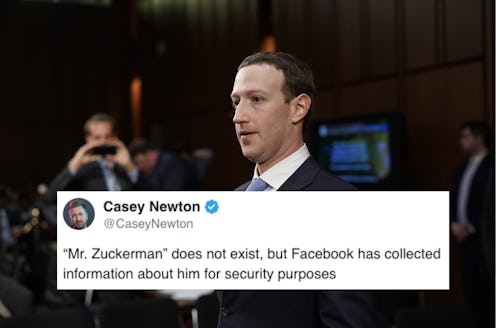News
These Mr. Zuckerman Memes & Jokes Will Make You ROFL

On Wednesday, Facebook CEO Mark Zuckerberg returned to Capitol Hill for his second day of congressional testimony, and just like the first day, it was full of pointed questions, evasive answers, and an absolute storm of media coverage. Social media, however, has recently been taken over by a very particular moment from the hearing ― specifically, "Mr. Zuckerman" memes and jokes are all over Twitter, the result of a brief, humorous gaffe on the part of New York representative Yvette Clarke.
If it weren't obvious from all the tweets referencing somebody named Zuckerman on Wednesday afternoon, Clarke, who represents New York's 9th congressional district, welcomed the 33-year-old Facebook CEO by botching his last name. Instead of Zuckerberg, she accidentally said Zuckerman, and the denizens of social media definitely noticed.
In relatively short order, people started tweeting about the Mr. Zuckerman flub, with the general consensus being that it was pretty silly and pretty funny. It's a nice bit of levity amid what's actually a quite serious and urgent conversation about Facebook's handling of user data, and matters of online privacy. And if that's the kind of break from the serious that you're looking for, you'll definitely enjoy some of these tweets.
"Mr. Zuckerman"
Here was the big moment, in all its awkward glory. Clarke didn't pause after making the error, instead moving right along to her questions and concerns.
I Should Not Be Giggling
Plenty of people seemed tickled pink by Clarke getting Zuckerberg's name wrong, and there were plenty of jokes to go around.
Facebook Has Collected Information About Him
It remains to be seen whether Zuckerberg himself will address the simmering, hugely crucial Zuckerman controversy.
Can You Please Tell Us
One aspect of Zuckerberg's congressional testimony that's gotten some attention from the press is that senators and representatives' relative illiteracy on technology and social media may have helped the Facebook chief avoid some tough questions.
This Was A Missed Opportunity
Some social media users have echoed these concerns, arguing that the U.S. Congress' general lack of knowledge and understanding of Facebook, and related technologies, basically made Zuckerberg's testimony a big missed opportunity.
A Very Dope Power Move
Given how rarely Zuckerberg is forced to answer pointed, contentious questions in a public setting, it's not hard to figure out why so many people were happy to see him under rhetorical fire.
And People Want The Government To Step In
Zuckerberg sat through a whopping 10 hours of testimony on Tuesday, and returned to face even more on Wednesday. The congressional scrutiny comes following last month's explosive report regarding Cambridge Analytica, a data firm hired by the Trump campaign during the 2016 presidential election.
In Response
Not everyone took the verbal gaffe as a lighthearted joke, to be clear. In fact, Clarke's primary challenger for the New York 9th district seat, Adem Bunkeddeko, tried to take some political advantage of the situation, attacking Clarke for failing to know the name of "the founder and CEO of one of the most important and influential tech companies of our time."
My View Of Congress
One person who got caught up in the Zuckerman fever was, well, a real live Mark Zuckerman. A beat reporter for the Washington Nationals baseball team, Zuckerman's Twitter notifications started blowing up after Clarke's mistake, leading him to tweet out a photo of his view of Congress ― a lot closer than most people's, but still nowhere near Zuckerberg's front-row seat.
Called Him "Mr. Zuckerman"
There's no doubt that Clarke's gaffe ― or Zuckerberg's new derisive moniker, however you want to look at it ― drew a ton of attention on social media.
It remains to be seen what, if any, consequences of ramifications Zuckerberg could face based on his testimony before Congress, whether by way of public criticism from politicians, or from calls for new forms of government regulation or oversight over his social media platform.